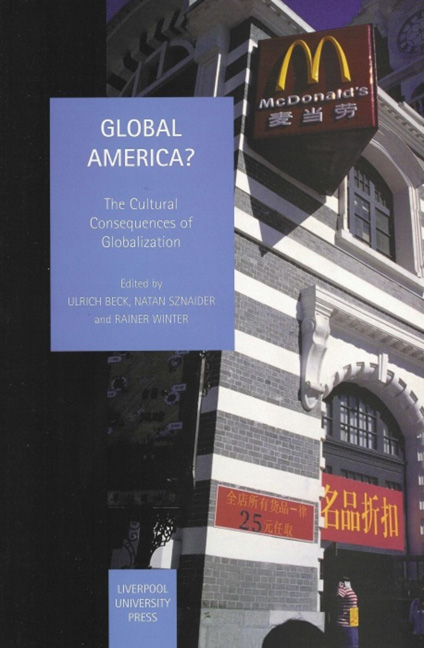Book contents
- Frontmatter
- Contents
- List of Contributors
- Acknowledgments
- Introduction
- PART I THEORETICAL PERSPECTIVES
- PART II NATIONAL CASE STUDIES
- 4 Hyperpower Exceptionalism: Globalization the American Way
- 5 Debating Americanization: The Case of France
- 6 Consumption, Modernity and Japanese Cultural Identity: The Limits of Americanization?
- 7 Americanization, Westernization, Sinification: Modernization or Globalization in China?
- PART III TRANSNATIONAL PROCESSES
- PART IV EPILOGUE
- Rethinking Americanization
6 - Consumption, Modernity and Japanese Cultural Identity: The Limits of Americanization?
from PART II - NATIONAL CASE STUDIES
- Frontmatter
- Contents
- List of Contributors
- Acknowledgments
- Introduction
- PART I THEORETICAL PERSPECTIVES
- PART II NATIONAL CASE STUDIES
- 4 Hyperpower Exceptionalism: Globalization the American Way
- 5 Debating Americanization: The Case of France
- 6 Consumption, Modernity and Japanese Cultural Identity: The Limits of Americanization?
- 7 Americanization, Westernization, Sinification: Modernization or Globalization in China?
- PART III TRANSNATIONAL PROCESSES
- PART IV EPILOGUE
- Rethinking Americanization
Summary
The case of Japan suggests an intriguing alternative to the dominant conception of Americanization. With its implicit connection with a globalizing consumer culture, Americanization has become synonymous with commodification, the rationalizing and material power of modernity, and Westernization. The question is, how valid is this understanding of globalization as a project of cultural imperialism spearheaded by a Western nation state, in particular in the context of those developments that go under the rubric of postmodernity/ multiple modernities/alternative modernities which have become more visible in the post-Cold War era?
Because of the non-essentialist ontology on which it is based, Japanese culture defies notions of cultural imperialism as well as conceptions of hybridity. The syncretic nature of Japanese culture rests less on a concept of overall unity or one rooted in an underlying objective reality, as in the West, than on harmony and form but in such a way that the relation between the elements is more important than a clear-cut identity. This non-synthetic sense of form – which is reflected in polytheism, a certain tolerance of contradiction and the absence of a conception of identity as equivalence – results in a strong emphasis on play, leading to a reduced level of cultural confrontation and resistance. I propose the thesis that Japanese culture, which cannot be so easily defined in terms of either the categories of Western modernity or those of late Western postmodernity, has been highly subversive of Americanization. The result of this has been, to use a formulation of S.N. Eisenstadt, the primacy of the ‘little tradition’ over the universalistic ones of the outside – the primacy of form and play over unity and rationality (Eisenstadt 1996). This view of the ontological structures of Japanese culture has implications for understanding the appropriation of America in Japanese culture and institutions. America in Japan was an expression of something like the ‘institutional imaginary’ as described by Castoriadis (1987); it was important for the reinvention of Japanese cultural identity in the post-Second World War period, and the idea of America allows Japan to express the contradiction of being both victim and aggressor. However, today America is losing its symbolic, imaginary content for the Japanese, who have not only domesticated America but have brought about a certain orientalization of the West.
- Type
- Chapter
- Information
- Global America?The Cultural Consequences of Globalization, pp. 114 - 133Publisher: Liverpool University PressPrint publication year: 2003



